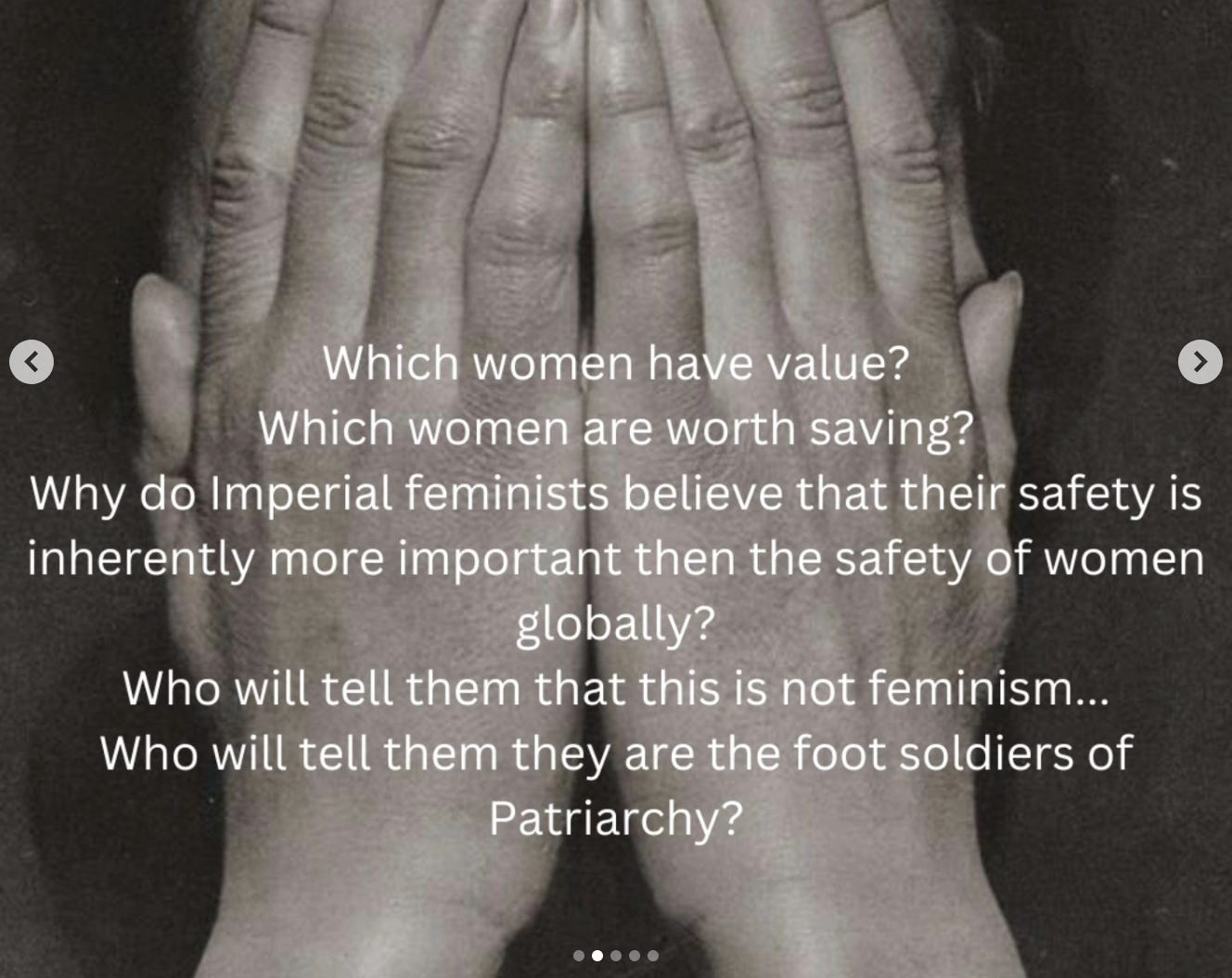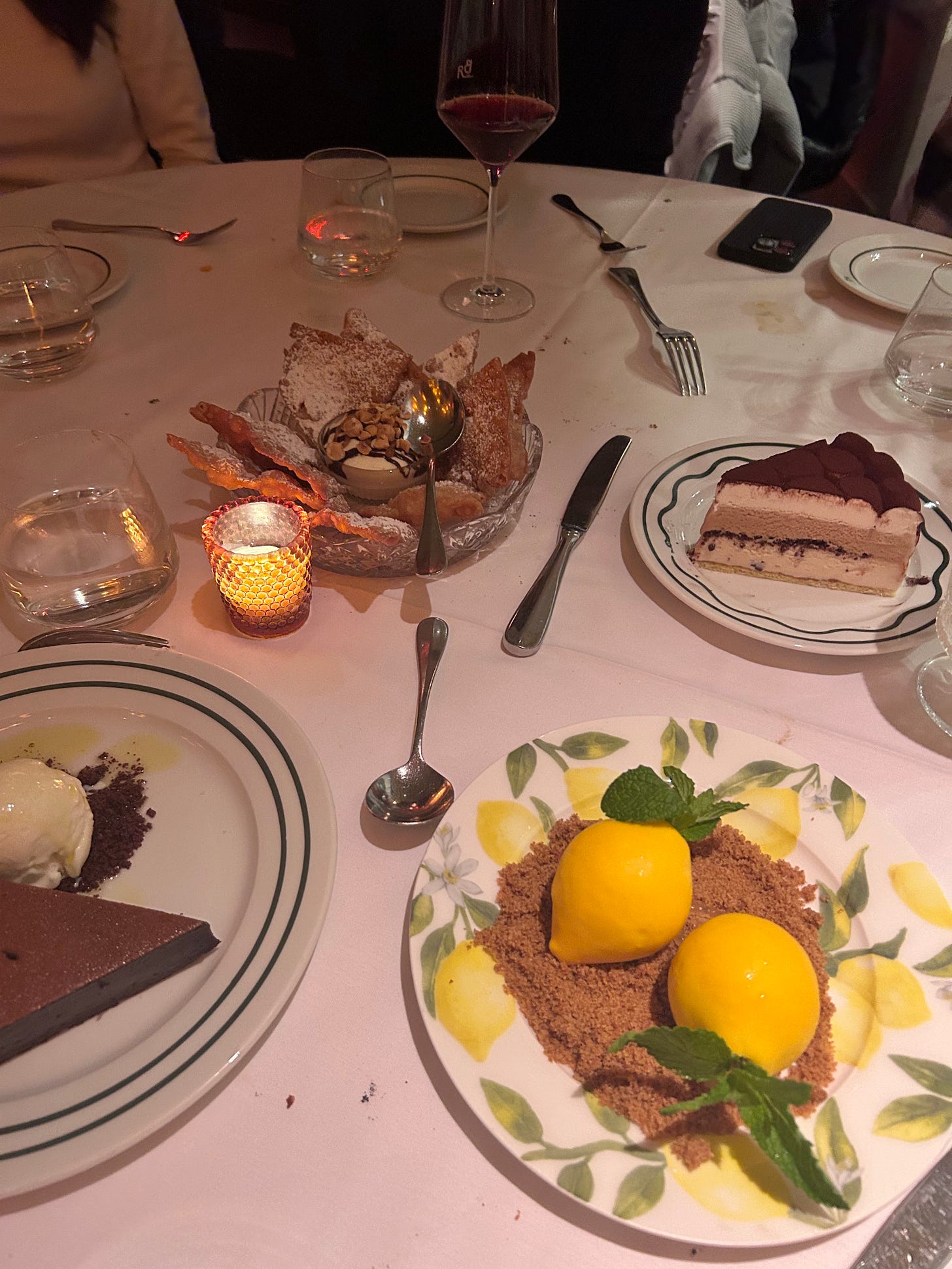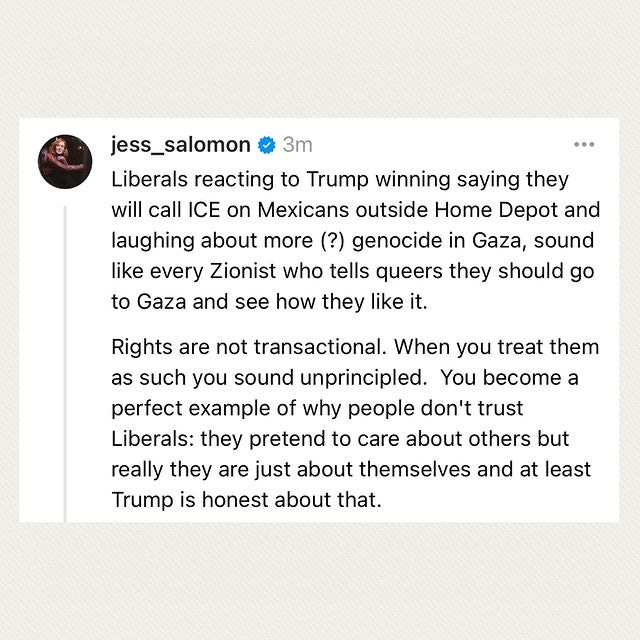I’ve read and listened to what feels like a million post-election recaps in the past week and a half, and, I promise, this is not that. In real life, interestingly (because it’s very unlike 2016) it seems like nobody I know wants to talk about it – the mood when we start grazing up against it turns cold with a tension that lives somewhere between total exhaustion and fear. I’ve had exactly two in-depth, in-real-life conversations about the election results and one of them really bothered me.
Like most people who are living, I care a lot. I have a tendency to pour my heart into things and people, which started to feel like a weakness in my adult life. I’ve been made to believe that I care too much, or I don’t care about the right things. Briefly, following the election, I didn’t want to care any more. As I texted my best friend: It hurts too much.
The conversation I had that bothered me was about which issues I care about, and how to channel my care, and anger, into the “right” ones. The “right” issues were identified as the realistic ones. This person encouraged me over and over that in order for change to happen, one much be realistic about it, and take it incrementally, step-by-step. Familiar, right?
That’s one of the arguments swirling around the left and anyone else craving a more equal, just, joyful world for everyone that bothers me the most. I’ve studied history, at length. You know what’s realistic? The status quo. And, although this isn’t an election recap, you know the strongest message coming out of this election? The status quo isn’t working for people anymore: Americans are demanding change. When people say “be realistic,” they are saying be practical. But you know what’s hardly ever seen as practical? Dreaming.
America prides itself on the classic narrative that here, you can be and do anything. It’s literally called “the American Dream.” Yet, any time in history or at present that any person or movement proposes alternative routes, straying from or replacing the status quo, they are labelled “unrealistic.” Bernie Sanders 2020 campaign was called unrealistic more than any other in my lifetime, but when you analyze the challenges his proposals faced, the real critique is that they would’ve been hard to pass. So, that means don’t try?
I’m finding it really annoying and at times, nearly insurmountable to face the constant rhetoric that this nation needs to change, that we should all fight for it, and the moment the opportunity or need for that fight and change arises, most people cling to “be realistic.” All I hear in that refrain is “I’m afraid.” Isn’t it better to be afraid and trying than afraid and complacent?
After the election, I watched a social media tsunami of “we need to fight” posts (almost always from people who have never attended a protest that wasn’t affiliated with pussy hats, if any) and worried. From where I, and others, sit, it doesn’t look like Americans have much fight in them right now. A couple of days post-election, writer Keeanga-Yamahtta Taylor was interviewed on Democracy Now! and traced the successful effort made to dismantle and disenfranchise any form of political or social movement in this nation in recent years. In response to another guest on the show saying that now’s the time to rise up, she said:
But you know, activism and social movements don’t often work like that. They’re not water faucets, where you just turn them off, and then, when you need them, you turn them back on…I think in the last election, in 2020, that there was so much focus on getting Biden elected and then winning those Georgia Senate races a few months later, that the whole focus of external pressure on elected officials was dissipated, and to such an extent that Biden faced no protest, really, until the end of the twilight of his term, last spring, when the Palestinian solidarity movement exploded, in a way, because it couldn’t be coopted by the Democratic Party, in ways that these other social movements not necessarily coopted, but absorbed into the Democratic Party program, organizers convinced that they had access to the Biden administration, that they had the ear of the Biden administration. And so, I think that we actually have a lot of rebuilding to do. I don’t think we’re going to see the same initial response that we saw in 2017 with the Women’s March and the immediate reaction to Donald Trump. There’s a lot of rebuilding that has to be done.
One of our biggest challenges in the years to come will be building the connections needed to sustain prolonged political action. Americans are extremely disconnected from each other, by design. Capitalism relies on hyper-individualism to drive consumerism and the labor force; while you’re focused on yourself, your wants/needs and those of your family, you’re not paying much attention to the systems and structures attacking others because you’re too worried about your own survival. Even having the time and energy to think deeply about the way our world works is a privilege.
Leading up to the election, I was surprised at how many people exclaimed online that the priority issues were the ones that affect them and their loved ones. The most immediately vulnerable people in the U.S. in the first weeks and months of the next Trump presidency are immigrants and minorities who might be targeted for deportation regardless of their status – full stop. People aren’t going to want to hear that, because of course, that’s not the only extremely vulnerable group of people. Realistically, all of the most vulnerable people in the nation are now in danger. But it’s very interesting watching people panic and coalesce around single issues closest to their own identities and personal comfort.
Someone said to me just after the election that I “globalize” political issues too much, and that I should focus only on the issues that effect my life. That completely contradicts my politics and values. I thought about The Feminine Mystique, by Betty Friedan, which was a revolutionary text when it came out, but is rightfully critiqued for its lack of class and race analysis: it misses intersectionality and now symbolizes white feminism since it only highlights the predicament of middle class white housewives. While I agree with that criticism, it ignores that when you’re looking at your oppression in a silo, without understanding how your plight is completely intertwined with the struggles of other groups, of course you think your struggle is the highest priority. Time and time again, we treat the concept of human rights like a finite resource. They’re not, but attention spans are. We live in a world where people only pay attention for as long as you hold their interest, or worse, when they feel like there’s something in it for them, so people desperately feel like they need to keep the spotlight on the issue that matters most to them. In actuality, we’re in a triage scenario. There are people literally being blown apart on a daily basis with American-made bombs funded by our tax dollars, and most of them are women and children. If I call myself a feminist who cares about reproductive justice, gender-affirming care, and women’s rights, how can I not also speak up for the right to life for those women too, addressing the urgency of their situation?
It’s overwhelming to think about all of this within a global context, but THAT is reality. All of our struggles really are interconnected, and true liberation requires that we all care about each other and do everything we can to support each other’s struggle. Audre Lorde’s often misused and co-opted quote says it best: “I am not free while any woman is unfree, even when her shackles are very different from my own.” While it’s impossible to devote yourself to every issue in need of addressing at once, and you will burn out that way, it’s possible to start by acknowledging this point. The point is, the ~system~ wants you to feel alone, but you are most definitely not. Loneliness, and the anger and resentment it breeds, keeps us divided and fighting with each other, and if you choose to see yourself as alone in your toil you will stay lonely. Seeing the world for what it is, in all of the ways it oppresses, provides the space and relief it takes to do what we really need: dream up something better.
This week, I read an incredibly moving essay by P.E. Moscowitz of Mental Hellth, called “Time to Give Up.” Moscowitz talked about the trauma of surviving the Charlottesville protest in 2017, when white nationalist James Alex Fields drove his car into the crowd of counterprotesters and killed Heather Heyer, injuring others. Once an active protester, they’ve struggled carving out a useful place for themself in resistance after such a horrific experience. Moscowitz wrote about how that’s where a lot of us are now: we need new, more effective forms of protest, and are hopefully asking ourselves, how can I be useful to change?
I’m sure many are also resigning themselves to doing nothing, again, as they always do, and that’s, in my opinion, fine. There’s a lot of social media shaming that goes on about how all of us need to do our part, but the truth is, shouting online is also not working. Maybe you’ve enlightened an ignorant jock from high school or two, or persuaded your Aunt Jan that unconscious bias informs her latent racism, and that’s not unimportant. That is a contribution, and every contribution matters, but it’s not activism. It’s not going to take away your anger or pain, it’s not going to convince the growing population who voted for Donald Trump or the 15 million Democratic voters who showed up in 2020 and didn’t in 2024 that the change they’re so desperately thirsting for is about to burst forth. Because it’s not.
This is where my detractors would say, “We need to invest our time and energy in realistic, incremental change via electoral politics. We need to convince people to vote.” Is that working? Really, I implore everyone to take a breath here and really contemplate: does that seem to be working? I propose something else entirely, that’s not really a plan for the long term, but a plan for right now: let’s dream.
Let’s be totally un-fucking-realistic and dare dream of a world we actually want to live in. Stop telling yourself and the optimists in your life that it’s not worth doing because it’ll never happen in our lifetimes, or it’s too hard, or whatever lame, cynical excuse that someone used to crush your hope that you’re now inflicting on others. If you didn’t have to pick between “the lesser of two evils” every four years, what would you want an ideal candidate to stand for? What do you want the world to be like for yourself, your friends, your family, your neighbors, the strangers you pass on the street, future generations? Too many people have told me that change relies on being realistic, and at the very least, that is so condescending. It’s also wrong. Every important change this country, since it’s inception (including its inception!!), has appeared unrealistic, especially at first. Sure, it takes patience and a long slog to create and implement major change, but that doesn’t make those dreams “practical” or “realistic” - it means they’re consistently driven by endurance and hope.
Earlier this fall, Jason and I had so much fun rooting for the Mets in the playoffs. Every time it looked like they’d lose, I’d see Jason’s face start to fall, disappointed once again by his lifelong favorite team, and I’d remind him, “You have to believe! I believe!” And we’d laugh, knowing that we can believe as hard as we want, but that belief can’t carry the ball where it needs to go. We also knew that believing means acknowledging how much you want your outcome, how high your hopes really are, and how far they have to fall. Disappointment is painful, and it’s hard to be disappointed again and again and again, but half the fun of loving a sport is, “there’s always next season.”
I am not comparing our current reality and its existing and looming horrors to sports. I’m also not saying, “There’s always the next election.” I am saying that I think healing from disappointment happens in hope, and hope comes from dreaming. We need to think less about how impossible this world feels, and more about the one we want to live in. Our current reality is the one that’s truly unrealistic: climate change is coming fast and we’re going to need as many creative solutions and inventions as we can possibly get to deal with it.
The past year has underscored for me, very plainly, that I don’t want to live in a world where people think it’s okay to treat others with callousness, cruelty, casual violence, ignorance, and hate. I’ve watched people turn the other cheek, daily, to atrocities I’ll never forget. I thought I’d lost all faith in humanity. But that doesn’t change that atrocities are still happening. My cynicism helps no one, least of all myself.
The antidote to cynicism is daydreaming – getting back in touch with creativity and longing. I’ve been dreaming about how to get involved. How do I find more people who think like me? I don’t have the answers yet, but I believe we will find some.
Hot
Gratitude - I’m not just saying this to be cute cause Thanksgiving is coming – when the going gets tough I use a little trick and try thinking about the things in my life that are good. I really like my little life, and so much of it has come to me in ways I never would’ve expected or dreamt of myself, and it’s just all so beautiful to me. Built-in hope right there whenever I need it.
Maybe Baby by Haley Nahman: What Else is There? - This essay after the election summed up so much of what I’ve been thinking and touches on exactly what I wrote about above: being in community with each other however we can is a start to something better for ourselves and each other.
Friendsgivings at restaurants! - We had a Friendsgiving this weekend at Bad Roman, ordered a bunch of things and shared everything and it was so much fun. It ended up being more expensive than everyone bringing a home-cooked dish so definitely a little extravagant, but it took the pressure off and meant we spent the entire time enjoying each other instead of shuffling plates and all the fun chaos that comes with hosting and attending. Recommend!
Bothered
Zach Siegel, “We Live in a Lonely World” - this essay delves deeper into America’s lonely problem, and inspired some of my thoughts above about loneliness. Zach writes frequently about this and I always find it unsettling and interesting.
Racism - I’ve seen so many liberals after the election saying horribly racist things online and it’s actually been unbelievable, along with the lack of resistance to it.
White women - A little tough love here: white women need to pause and reflect rn. The amount of middle class, coastal white women in my social media feed acting as though they are personally on Trump’s list of who to target first is wild. You are allowed to be scared, but you need to stop making this about yourself. There are so many people who need you to apply your anger, care, and action to them instead of navel-gazing.
Thanks making it here! Leaving you with this:





